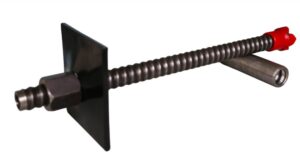In underground construction and geotechnical projects, rock bolts are essential for maintaining ground support and ensuring structural stability. From mining tunnels to slope stabilization, the quality and reliability of rock bolts can determine the safety and success of entire infrastructure projects. For buyers, engineers, and procurement specialists, selecting a certified and technically competent rock bolt manufacturer is not just a preference—it’s a necessity.
This article outlines the key international and technical standards that a rock bolt manufacturer must comply with, offering data-backed comparisons and practical insights for making informed sourcing decisions.
Why Standards Matter When Choosing a Rock Bolt Manufacturer
Rock bolts are installed in environments where failure could lead to significant safety hazards or project delays. Unlike standard steel components, rock bolts must meet stringent mechanical, dimensional, and environmental resistance standards.
A qualified rock bolt manufacturer must ensure:
- Product consistency across large batches
- Resistance to corrosion and stress fatigue
- Compatibility with regional regulations and testing norms
Without these assurances, even minor discrepancies in tensile strength or coating thickness can lead to anchor failure. In fact, structural audits in mining and tunneling projects show that over 20% of premature bolt failures can be traced to substandard manufacturing or lack of documentation.
Key Certifications and International Standards for Rock Bolt Manufacturers
1. ISO 9001:2015 – Quality Management System
ISO 9001 compliance demonstrates that a rock bolt manufacturer maintains process control, documentation integrity, and continuous quality improvement.
Why it matters:
- Reduces the risk of dimensional variation and surface defects
- Mandates internal quality audits and process validation
- Increases credibility in international tenders and government procurement
2. ASTM F432 – U.S. Standard for Roof and Rock Bolts
This is a critical American standard for mechanical expansion anchors, friction bolts, and resin-grouted rock bolts. It covers:
- Thread profiles
- Tensile and yield strength requirements
- Corrosion coating standards
Typical Requirements (ASTM F432):
| Parameter | Specification |
| Yield Strength | ≥ 620 MPa |
| Ultimate Tensile Strength | ≥ 860 MPa |
| Elongation (200 mm) | ≥ 15% |
| Surface Coating | Hot-dip galvanized or epoxy |
Failure to meet ASTM standards could disqualify products from federal or mining contracts in North America.
3. EN 14490 – European Anchoring Systems for Geotechnical Use
In the EU, EN 14490 regulates the performance and testing of anchoring systems used in soil and rock. It includes:
- Guidelines for bonded and mechanical anchors
- Load transfer tests
- Acceptance criteria for underground installations
A rock bolt must be capable of resisting tensile loads up to 300–1500 kN, depending on the application and bolt design.
4. ISO 10208 – Rock Reinforcement Testing Methods
While this standard focuses more on testing than design, any reliable rock bolt manufacturer must comply with ISO 10208 when validating the bolt’s shear resistance, tensile capacity, and long-term creep behavior.
These tests simulate in-situ stress conditions, ensuring the bolts meet safety factors over 1.5 to 2.0, depending on geological risks.
Technical Benchmarks Every Rock Bolt Manufacturer Should Deliver
Material Grades and Consistency
A reputable rock bolt manufacturer typically uses:
- Carbon steelwith 0.3%–0.6% carbon content for strength
- Alloy steel(e.g., 40Cr, 20MnSi) for enhanced fatigue resistance
- Stainless steel for corrosive or marine environments
| Steel Type | Yield Strength | Suitable Application |
| Q235 | ~250 MPa | Low-stress environments |
| 20MnSi | ~500 MPa | General civil & mining projects |
| 40Cr | ~800 MPa | High-load tunnels and dams |
| 304 Stainless | ~215 MPa | High-corrosion zones |
Manufacturers should offer full material traceability, including mill certificates and batch test reports.
Surface Protection and Corrosion Resistance
Corrosion can reduce the mechanical strength of a rock bolt by up to 35% over 10 years in aggressive environments. A qualified manufacturer should offer:
- Hot-dip galvanizing(coating thickness ≥ 85 μm)
- Fusion bonded epoxy (FBE) coating
- Double corrosion protection (DCP)systems
- Encapsulationfor permanent applications
Failure to properly coat bolts in coastal, marine, or high-humidity environments can accelerate failure and compromise project warranties.
Testing and Certification Procedures
Every rock bolt manufacturer should conduct the following tests as part of their QA process:
- Tensile Testing– According to ASTM E8 or ISO 6892
- Proof Load Testing– Typically at 1.25–1.5× working load
- Corrosion Testing– Salt spray tests (per ASTM B117)
- Pull-Out Tests in Grouted Conditions– Simulated site behavior
All test reports should be archived for at least 5 years and made available upon request.
Rock Bolt Manufacturer vs. General Hardware Supplier
| Feature | Rock Bolt Manufacturer | General Supplier |
| Compliance with ISO/ASTM/EN | ✔️ | ❌ / Inconsistent |
| Application-Specific Engineering | ✔️ (customization available) | ❌ (off-the-shelf only) |
| Surface Treatment Options | Galvanizing, epoxy, DCP | Limited |
| Full QA Documentation | ✔️ (mill certs, test reports) | Often unavailable |
| International Supply Chain Ready | ✔️ (export licenses, customs docs) | ❌ |
Red Flags to Avoid When Evaluating a Rock Bolt Manufacturer
- Lack of compliance documents or certifications
- No record of pull testing or batch traceability
- Only standard sizes and materials available
- Unclear lead times or MOQ for custom orders
- Inconsistent corrosion protection claims
Ask for recent third-party test results or certificates like CE, ISO, and MSHA approval if applicable to your region or sector.
Conclusion
Choosing the right rock bolt manufacturer is not just about price—it’s about ensuring long-term reliability, safety, and regulatory compliance. Standards like ISO 9001, ASTM F432, and EN 14490 exist to protect both end-users and infrastructure. Any serious manufacturer should proactively align their production and testing processes with these benchmarks and be fully transparent about their capabilities.
Whether you’re involved in mining, hydropower tunneling, or slope stabilization, insist on working with a rock bolt manufacturer that adheres to these key standards. Your project’s integrity—and lives—may depend on it.

